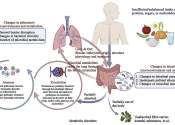Using AI to improve Alzheimer's treatment through the 'gut-brain axis'
Cleveland Clinic researchers are using artificial intelligence to uncover the link between the gut microbiome and Alzheimer's disease.
Apr 22, 2024
0
99
Cleveland Clinic researchers are using artificial intelligence to uncover the link between the gut microbiome and Alzheimer's disease.
Apr 22, 2024
0
99

Myocardial infarction, more commonly known as a heart attack, is a leading cause of death worldwide. Biomarkers called plasma metabolites may play a key role in the physiological pathways involved in myocardial infarctions. ...
Apr 17, 2024
0
4

While cancer remains one of the leading global causes of death, advancements in cancer therapies have significantly improved its manageability and potential for cure. Among these revolutionary cancer treatments are chimeric ...
Mar 26, 2024
0
0

Chronic obstructive pulmonary disease (COPD) is a chronic lung disease with irreversible airflow limitation and a leading cause of death worldwide. COPD is characterized by chronic bronchitis and emphysema and is associated ...
Mar 21, 2024
0
0

Science China Life Sciences has reported on the research results of Lanjuan Li's team from Zhejiang University. Recent advances in microbiome research have revealed complex changes in gut microecology across various disease ...
Mar 15, 2024
0
0

Gut bacteria and a diet rich in the amino acid tryptophan can play a protective role against pathogenic E. coli, which can cause severe stomach upset, cramps, fever, intestinal bleeding and renal failure, according to a study ...
Mar 13, 2024
0
23

Alzheimer's disease (AD) is the most common form of dementia and affects memory and thinking in the elderly. With a projected global increase in the number of affected individuals, reaching an estimated 152.8 million by 2050, ...
Feb 13, 2024
0
10

Once they enter the body, drugs, apart from carrying out their therapeutic function, are biochemically transformed by the action of the metabolic machinery, a process that facilitates their expulsion. This biotransformation ...
Feb 9, 2024
0
51

During pregnancy, a woman's immune system changes dramatically but researchers don't yet understand all the underlying mechanisms. A new study shows how the gut microbiota may play a role.
Feb 7, 2024
0
0

A large team of ob-gyns, regenerative medicine and fetal development specialists and metabolic researchers in China has tested macaques and mapped many of the changes that happen to metabolic pathways in primates during pregnancy.

Metabolites are the intermediates and products of metabolism. The term metabolite is usually restricted to small molecules. A primary metabolite is directly involved in normal growth, development, and reproduction. Alcohol is an example of a primary metabolite produced in large-scale by industrial microbiology. A secondary metabolite is not directly involved in those processes, but usually has an important ecological function. Examples include antibiotics and pigments. Some antibiotics use primary metabolites as precursors, such as actinomycin which is created from the primary metabolite, tryptophan.
Examples of primary metabolites produced by industrial microbiology:
The metabolome forms a large network of metabolic reactions, where outputs from one enzymatic chemical reaction are inputs to other chemical reactions.
Metabolites from chemical compounds, whether inherent or pharmaceutical, are formed as part of the natural biochemical process of degrading and eliminating the compounds. The rate of degradation of a compound is an important determinant of the duration and intensity of its action. Profiling metabolites of pharmaceutical compounds, drug metabolism, is an important part of drug discovery, leading to an understanding of any undesirable side effects.
This text uses material from Wikipedia, licensed under CC BY-SA